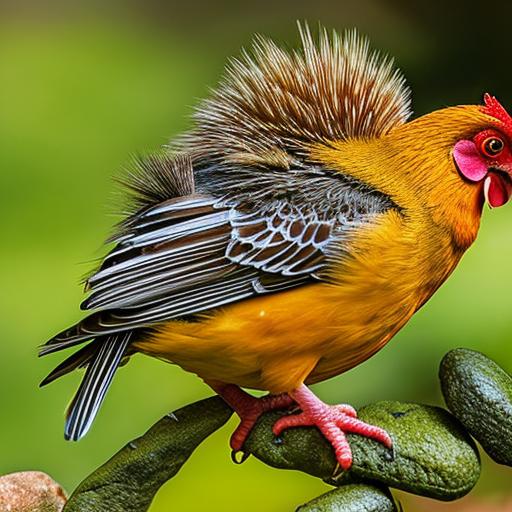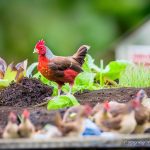Keeping chickens in your garden can be a rewarding and fulfilling experience. Not only do chickens provide fresh eggs, but they also offer natural pest control and can help fertilize your garden. Whether you have a large backyard or a small urban space, keeping chickens can be a fun and sustainable addition to your garden.
Key Takeaways
- Keeping chickens in your garden can provide fresh eggs, natural pest control, and fertilizer for your plants.
- It’s important to research and follow local laws and regulations for keeping chickens in your area.
- Choosing the right breeds for your garden depends on factors such as egg production, temperament, and climate.
- Building a safe and secure chicken coop is crucial for protecting your chickens from predators and providing a comfortable living space.
- Feeding and caring for your chickens involves providing a balanced diet, clean water, and regular health check-ups.
The Benefits of Keeping Chickens in Your Garden
One of the main benefits of keeping chickens in your garden is the abundance of fresh eggs they provide. There is nothing quite like collecting eggs from your own backyard and enjoying them for breakfast. Not only are fresh eggs delicious, but they are also more nutritious than store-bought eggs. Chickens that are allowed to roam and forage for their food produce eggs that are higher in omega-3 fatty acids and vitamins.
In addition to fresh eggs, chickens also offer natural pest control for your garden. They love to eat insects, slugs, and snails, which can be a nuisance to your plants. By allowing chickens to roam freely in your garden, they will help keep these pests under control without the need for harmful chemicals.
Understanding Local Laws and Regulations for Keeping Chickens
Before you decide to keep chickens in your garden, it is important to understand the local laws and regulations regarding poultry keeping. Some cities have specific ordinances that dictate the number of chickens you can have, the size of your coop, and the distance it must be from neighboring properties. It is crucial to research these laws before getting chickens to avoid any legal issues or conflicts with neighbors.
To find out about local laws and regulations, start by contacting your city or county government offices. They will be able to provide you with information on any permits or licenses you may need, as well as any restrictions or guidelines you must follow. You can also reach out to local poultry associations or organizations for advice and resources.
Choosing the Right Breeds for Your Garden
When choosing chickens for your garden, it is important to consider the breeds that are best suited for your specific needs and environment. Some breeds are better at foraging and pest control, while others are known for their egg-laying abilities. It is important to choose breeds that will thrive in your climate and meet your desired goals.
For gardens, breeds such as Rhode Island Reds and Plymouth Rocks are popular choices. These breeds are known for their ability to forage and adapt to various climates. They are also good egg layers, providing a steady supply of fresh eggs. Other breeds to consider include Australorps, Sussex, and Orpingtons.
Building a Safe and Secure Chicken Coop
Building a safe and secure chicken coop is essential for the well-being of your chickens. A good coop will protect them from predators, provide shelter from the elements, and offer a comfortable living space. When building a chicken coop, it is important to use sturdy materials that can withstand the elements and potential predators.
The coop should have proper ventilation to prevent moisture buildup and ensure good air circulation. It should also have secure doors and windows to keep predators out. The size of the coop will depend on the number of chickens you plan to keep, but it should provide enough space for them to move around comfortably.
Feeding and Caring for Your Chickens

Feeding and caring for your chickens is crucial to their health and well-being. Chickens require a balanced diet that includes grains, protein, fruits, vegetables, and fresh water. You can purchase commercial chicken feed or create your own mix using ingredients such as corn, wheat, soybean meal, and calcium.
It is important to provide fresh water at all times and clean the water containers regularly to prevent bacterial growth. Chickens also enjoy treats such as kitchen scraps, fruits, and vegetables. However, it is important to avoid feeding them anything toxic or harmful, such as chocolate, onions, or avocado.
Managing Chicken Waste in Your Garden
Managing chicken waste is an important aspect of keeping chickens in your garden. Chicken manure is a valuable source of nutrients for your plants, but it needs to be managed properly to avoid odor and contamination. One way to manage chicken waste is by composting it. Chicken manure can be added to a compost pile along with other organic materials, such as leaves and grass clippings, to create nutrient-rich compost for your garden.
Another option is to use chicken manure directly as fertilizer. However, it is important to let the manure age for at least six months before using it on your plants. Fresh chicken manure can be too strong and may burn your plants. By properly managing chicken waste, you can turn it into a valuable resource for your garden.
Dealing with Predators and Pests
When keeping chickens in your garden, it is important to take precautions to protect them from predators and pests. Common predators include raccoons, foxes, coyotes, and even neighborhood dogs. To keep predators out, it is important to have a secure coop with sturdy fencing and locks on doors and windows.
In addition to predators, chickens can also attract pests such as rats and mice. To deter these pests, keep the coop clean and free of food scraps. Store feed in secure containers that cannot be accessed by rodents. Regularly inspect the coop for any signs of pests and take appropriate measures to eliminate them.
Integrating Chickens into Your Garden Ecosystem
Chickens can be integrated into your garden ecosystem in various ways. They can help control pests by eating insects and other small creatures that can damage your plants. Allowing chickens to roam freely in your garden will give them the opportunity to forage for food and help keep pest populations under control.
Chickens also enjoy taking dust baths, which helps keep them clean and free of parasites. You can create a designated dust bath area in your garden by providing a shallow container filled with sand or dirt. This will not only benefit your chickens but also help improve the soil quality in that area.
Harvesting Fresh Eggs from Your Garden
One of the joys of keeping chickens in your garden is the ability to harvest fresh eggs. To ensure the best quality eggs, it is important to collect them daily and store them properly. Eggs should be collected as soon as possible after they are laid to prevent them from getting dirty or cracked.
To store eggs, keep them in a cool and dry place, such as a refrigerator. It is best to store them with the pointed end down to help maintain their freshness. Fresh eggs can last for several weeks if stored properly.
Sharing the Joys of Keeping Chickens with Your Community
Keeping chickens in your garden can be a wonderful way to connect with your community and share the joys of sustainable living. Consider hosting a chicken coop tour or participating in local events that promote urban farming and backyard chickens. You can also share the abundance of fresh eggs with your neighbors, friends, and family.
By sharing your experiences and knowledge about keeping chickens, you can inspire others to consider this rewarding hobby and contribute to a more sustainable and self-sufficient community.
Keeping chickens in your garden offers numerous benefits, from fresh eggs to natural pest control. By understanding local laws and regulations, choosing the right breeds, building a safe coop, and providing proper care, you can enjoy the many rewards of keeping chickens in your garden. So why not consider adding these feathered friends to your garden and experience the joy of sustainable living firsthand?
If you’re considering keeping chickens in your garden, you may also be interested in learning about the mating season for turkeys. Understanding the breeding patterns and behaviors of turkeys can provide valuable insights into successfully raising these birds. To learn more about this topic, check out this informative article on PoultryWizard.com. Additionally, if you’re wondering how many chickens you need to keep for a family of four, this article on PoultryWizard.com provides helpful guidelines. Lastly, if you’re in need of a chicken coop for your feathered friends, this article on PoultryWizard.com offers insights into choosing the right coop size and design.
FAQs
What are the benefits of keeping chickens in a garden?
Keeping chickens in a garden can provide a source of fresh eggs, natural pest control, and fertilizer for the garden. Chickens can also be entertaining pets and can help teach children about responsibility and animal care.
What are the legal requirements for keeping chickens in a garden?
The legal requirements for keeping chickens in a garden vary depending on the location. It is important to check with local authorities to determine if there are any zoning or permit requirements. Some areas may have restrictions on the number of chickens allowed or require specific coop and fencing requirements.
What kind of space do chickens need in a garden?
Chickens need a minimum of 4 square feet of indoor space and 10 square feet of outdoor space per bird. The outdoor space should be fenced to protect the chickens from predators and provide a safe area for them to roam. The coop should also be well-ventilated and provide nesting boxes for the chickens to lay eggs.
What do chickens eat and how do you care for them?
Chickens eat a variety of foods including chicken feed, grains, fruits, and vegetables. They also require access to clean water at all times. Chickens should be checked daily for any signs of illness or injury and their coop and outdoor area should be cleaned regularly to prevent the spread of disease.
What are the potential drawbacks of keeping chickens in a garden?
Keeping chickens in a garden can be noisy and may disturb neighbors. Chickens can also attract predators such as raccoons and foxes, which can be a danger to the chickens. Additionally, chickens can create a mess in the garden and their waste can attract flies and other pests.
Meet Walter, the feathered-friend fanatic of Florida! Nestled in the sunshine state, Walter struts through life with his feathered companions, clucking his way to happiness. With a coop that’s fancier than a five-star hotel, he’s the Don Juan of the chicken world. When he’s not teaching his hens to do the cha-cha, you’ll find him in a heated debate with his prized rooster, Sir Clucks-a-Lot. Walter’s poultry passion is no yolk; he’s the sunny-side-up guy you never knew you needed in your flock of friends!







